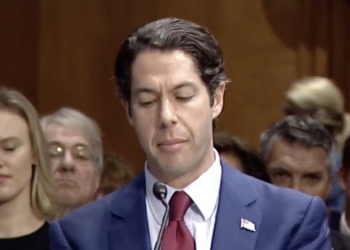The Trump administration is gearing up to try to revoke one of the most overreaching, unscientific regulatory edifices ever erected: the EPA’s 2009 “endangerment finding.” News broke this week that the Environmental Protection Agency has drafted a plan to rescind this cornerstone of federal climate policy, which declared that greenhouse gases like carbon dioxide and methane pose a danger to human health and welfare.
If this move succeeds, it would limit the federal government’s ability to regulate carbon dioxide emissions from cars, power plants, and industries—a prospect that has the climate alarmist crowd clutching their pearls. And frankly, it’s about time someone challenged this rank absurdity.
Let’s take a walk down memory lane to 2009, when the Obama-era EPA, emboldened by the 2007 Supreme Court ruling in Massachusetts v. EPA, decided to anoint itself the arbiter of America’s energy future. The endangerment finding was born, asserting that CO2 – literally plant food, and the fundamental building block for all life on planet Earth – is actually a “pollutant” that “endangers public health” as defined under the Clean Air Act. (RELATED: Dems Mourn Closure Of EPA Office That Once Tested Toxic Pollutants On Humans)
This vast expansion of the regulatory state wasn’t based on some groundbreaking scientific discovery but rather on a political agenda dressed up in green rhetoric. The finding has since provided the legal foundation for a slew of regulations, from tailpipe emissions standards to power plant rules, all designed to choke the fossil fuel industry and push the U.S. toward a so-called “clean energy” utopia that exists only in the fever dreams of climate activists.
Now, the Trump EPA, led by Administrator Lee Zeldin, appears poised to dismantle this house of cards. Zeldin’s draft proposal argues that the EPA overstepped its authority by issuing such a sweeping determination.
The plan focuses on a legal argument that the EPA’s administrator lacks the power to make broad proclamations about greenhouse gases without specific congressional authorization. This is a direct jab at the 2007 Supreme Court decision, a judicial overreach that gave unelected bureaucrats a blank check to regulate the economy. It is key to also remember that that decision came at a time when the Chevron Deference, which the Court did away with a year ago, was still in effect.
Adopted in 1984, the Chevron Deference held that courts must defer to the judgment of regulators when interpreting the congressional intent of federal statutes. But the Clean Air Act was never designed to regulate CO2, a point even the late Rep. John Dingell, a co-author of the law, made clear.
Of course, the climate alarm lobby will drag this fight into the courts, so overturning the finding will not be easy. The EPA must navigate a minefield of procedural requirements under the Administrative Procedure Act, and the alarmists will try to overwhelm the courts with claims that climate change has only grown since 2009, asserting that every extreme weather event somehow proves their case.
But the Trump administration isn’t denying climate change outright; it’s questioning whether the EPA has the legal authority to act as America’s climate czar. This is a fight worth having, because if the agency can regulate CO2 without clear congressional approval, what’s stopping it from declaring water vapor a pollutant next?
The bigger picture here illustrates the absurdity of the energy transition itself. The endangerment finding has been a cudgel to force a shift away from reliable, affordable fossil fuels toward a fantasy of windmills and solar panels that can’t power a modern economy. The U.S. is the second-largest emitter of greenhouse gases globally, but even if we zeroed out emissions tomorrow, global temperatures would barely budge without similar action from China and India.
Meanwhile, Americans bear the brunt of higher energy costs and a less reliable grid. Rescinding the endangerment finding could free up the economy to innovate without the EPA’s heavy hand, letting market forces—not bureaucrats—drive energy and climate solutions.
This move is a bold step toward dismantling the regulatory state’s stranglehold on American energy. It won’t be quick or easy, and the climate zealots will fight tooth and nail. But if the Trump administration can pull it off, it’ll be a victory for common sense over green dogma, a win for innovation over regulation. A long, hard fight lies ahead, but it is one worth having, and which is long overdue.
David Blackmon is an energy writer and consultant based in Texas. He spent 40 years in the oil and gas business, where he specialized in public policy and communications.
The views and opinions expressed in this commentary are those of the author and do not reflect the official position of the Daily Caller News Foundation.
All content created by the Daily Caller News Foundation, an independent and nonpartisan newswire service, is available without charge to any legitimate news publisher that can provide a large audience. All republished articles must include our logo, our reporter’s byline and their DCNF affiliation. For any questions about our guidelines or partnering with us, please contact licensing@dailycallernewsfoundation.org.



![Former Bravo Star Charged After Violent Assault Using a Rock-Filled Sock in Tennessee Walmart [WATCH]](https://www.right2024.com/wp-content/uploads/2025/07/Former-Bravo-Star-Charged-After-Violent-Assault-Using-a-Rock-Filled-350x250.jpg)



![NYC Man Snatches Child Off The Sidewalk, Parents Chase Him Down [WATCH]](https://www.right2024.com/wp-content/uploads/2025/07/NYC-Man-Snatches-Child-Off-The-Sidewalk-Parents-Chase-Him-350x250.jpg)
![Karoline Leavitt Levels CNN's Kaitlan Collins and Other Legacy Media Reporters [WATCH]](https://www.right2024.com/wp-content/uploads/2025/07/Karoline-Leavitt-Levels-CNNs-Kaitlan-Collins-and-Other-Legacy-Media-350x250.jpg)
![Man Arrested After Screaming at Senators During Big Beautiful Bill Debate [WATCH]](https://www.right2024.com/wp-content/uploads/2025/06/Man-Arrested-After-Screaming-at-Senators-During-Big-Beautiful-Bill-350x250.jpg)
![Illegal Alien Walked Free After Decapitating Woman, Abusing Corpse for Weeks [WATCH]](https://www.right2024.com/wp-content/uploads/2025/07/1753013138_Illegal-Alien-Walked-Free-After-Decapitating-Woman-Abusing-Corpse-for-350x250.jpg)






